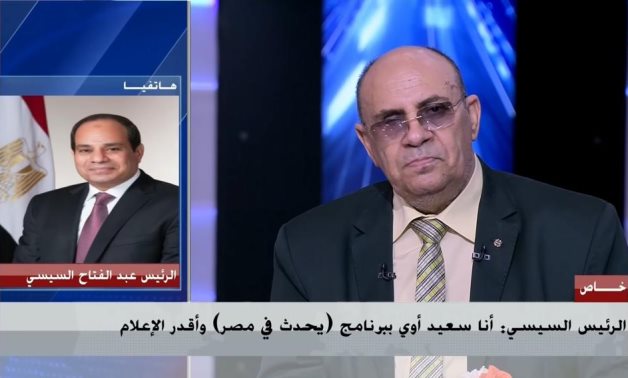
TV screenshot of President Abdel Fatah al-Sisi's phone-in with Islamic Scholar Mabrouk Ateya on October 27, 2021>
CAIRO - 4 November 2021: For decades, politicians have avoided any comments on “men of religion” to avoid risking their positions. President Abdel Fattah el-Sisi, however, has not shied away from tackling topics related to religion since he assumed power. Most recently, he called Dr. Mabrouk Ateya, a renowned Islamic scholar, in a talk show Oct. 27.
Ateya has regularly appeared on TV for many years as a guest or as a host who receives phone calls from people seeking a religious opinion. He is popular and well-loved for his sense of humor, ability to speak in a simple language, and explaining his fatwas in a way easily understood by most people regardless of their level of education.
Some find his language too simple for the serious topics he tackles, his humor too inappropriate for his stature, his opinions too influenced by traditions.
The reality, however, is that not only do his videos attract thousands and sometimes millions of views for the TV channels in which he works, but YouTubers who just lip sync Ateya’s videos also bring about thousands of views.
Ateya appears once a week on MBC Masr T.V. channel. On Oct. 20, a week before Sisi’s call, a woman was invited to the show alongside Ateya, alleging that her husband spit on her, abused and tortured her, and even stabbed her. Ateya’s reaction was to claim that “women exaggerate,” and that she may have “provoked” her husband. If her husband, with whom she has four children, apologized, they should get back together, Ateya insisted.
An online backlash followed, but he responded in a home video, saying that nobody witnessed what really happened. Sarcastically, he said those who call for a divorce should volunteer to fend for the woman and her kids in case they -the volunteers- do provide for their own families in the first place.
He wondered who would marry a divorced woman with four kids and how would she find money to support her family after divorce.
Carefully selecting his words, Sisi told Ateya live on TV “I won’t say a note or anything, because revered scholars are not to be told notes. But I believe those who hear us come from different cultures and ideas that may be vastly varied.”
“Not everyone will receive [your] words with the same understanding that you mean to put on the table. I do not know if I could communicate this point to you, Dr. Ateya. You do not say everything you want even if it has what supports it and has intellectual merit, because we won’t all understand the same way. Stemming from this, the speaker needs to consider that his listeners are not the same and their ideas are different, like I said.”
Sisi’s call was widely praised by women’s rights groups, including Speak Up, an NGO that presents itself as a feminist initiative supporting victims of violence.
Sisi, albeit careful, has taken it upon himself to speak about a sensitive topic such as religious discourse. In January 2015, he famously called for a “religious revolution,” where he urged Islamic scholars to radically update their speech and to refute extremist ideologies that use religion as a cover.
“The culture of the society is changing, and this is changing the media. Today, no one would accept to hear the things that people used to accept before and had no problem with as they were considered normal. The majority are now aware that incitement to violence or harassment and justifying them cause disasters,” Speak Up said in a Facebook post on Oct. 28 with a video of the president’s phone call, where Ateya is as nodding with a smile.
“Thankful that girls’ voice is heard. Thank you, President Abdel Fattah El-Sisi. We hope Egypt always changes for the better,” Speak Up said.
The issue of money, children, and the odds of a divorced woman getting married once again are Ateya’s premises for discouraging any divorce and forgiving a husband’s wrongdoing.
According to CAPMAS in August 2021, manpower in Egypt has 24.1 million males and five million females.
Ateya’s logic was refuted by head of the Egyptian Center for Women’s Rights, Nehad Aboul Komsan. She told the BBC on Oct. 25 there are only a few state-run shelters for victims of domestic violence. There should be more as well as more awareness about their very existence, she said.
Aboul Komsan still encouraged abused women to flee an abusive marriage and reach out to from women’s rights and human rights organizations, whether affiliated with the state or the civil society, which would provide free legal assistance and walk the woman through the steps that would protect her from retribution.

Comments
Leave a Comment